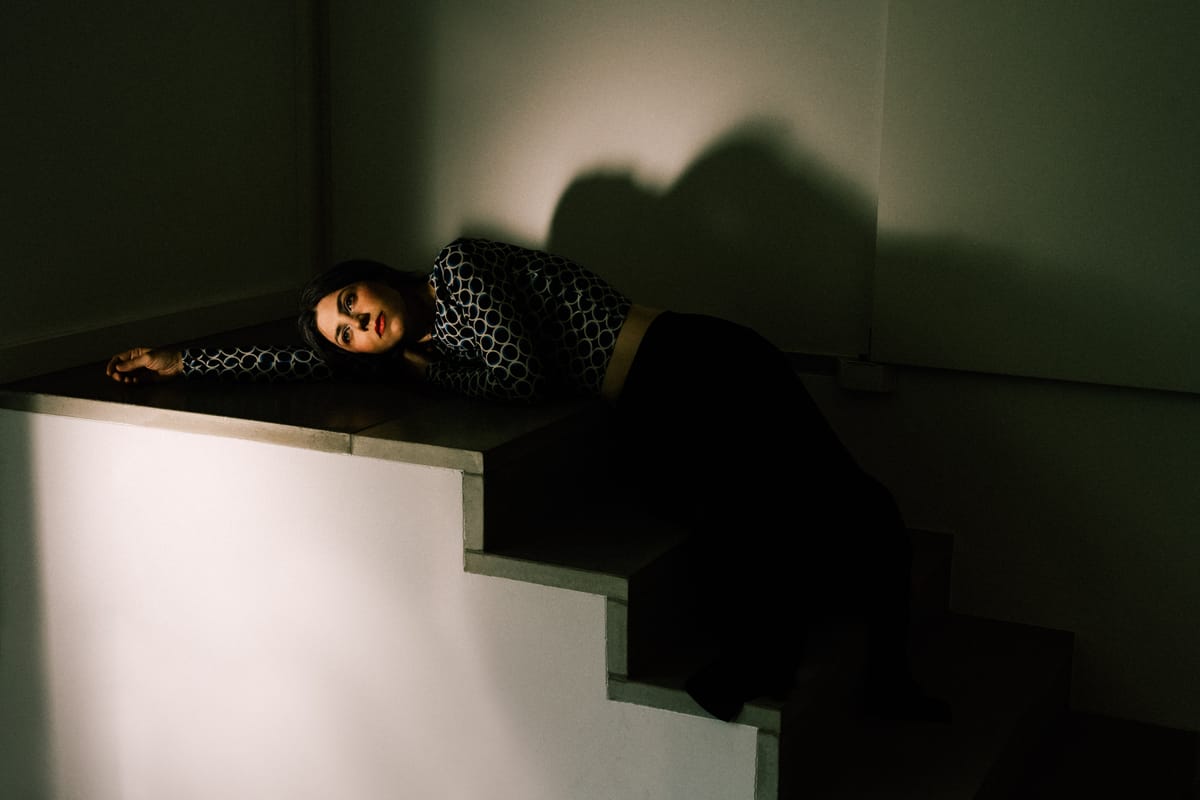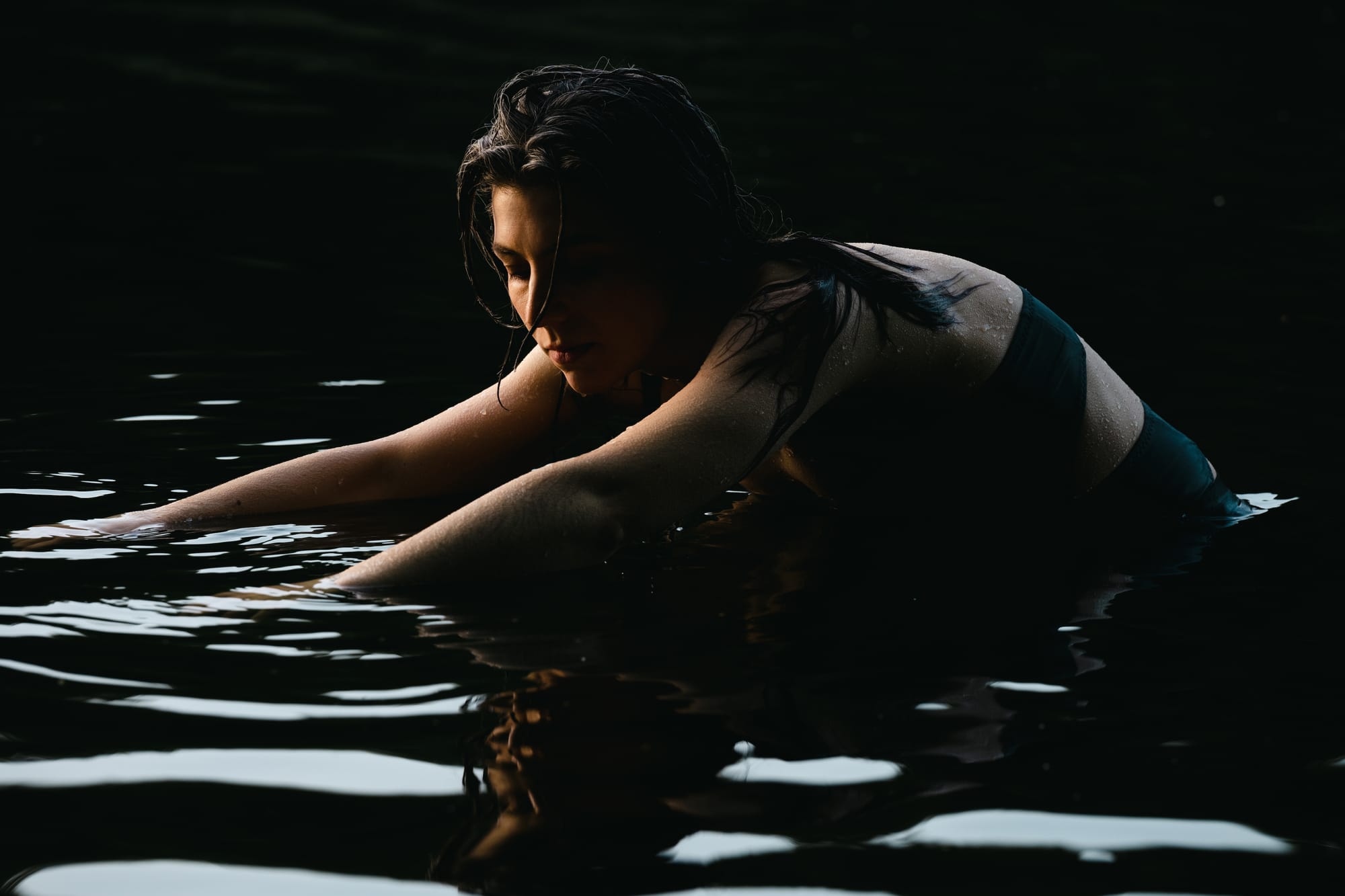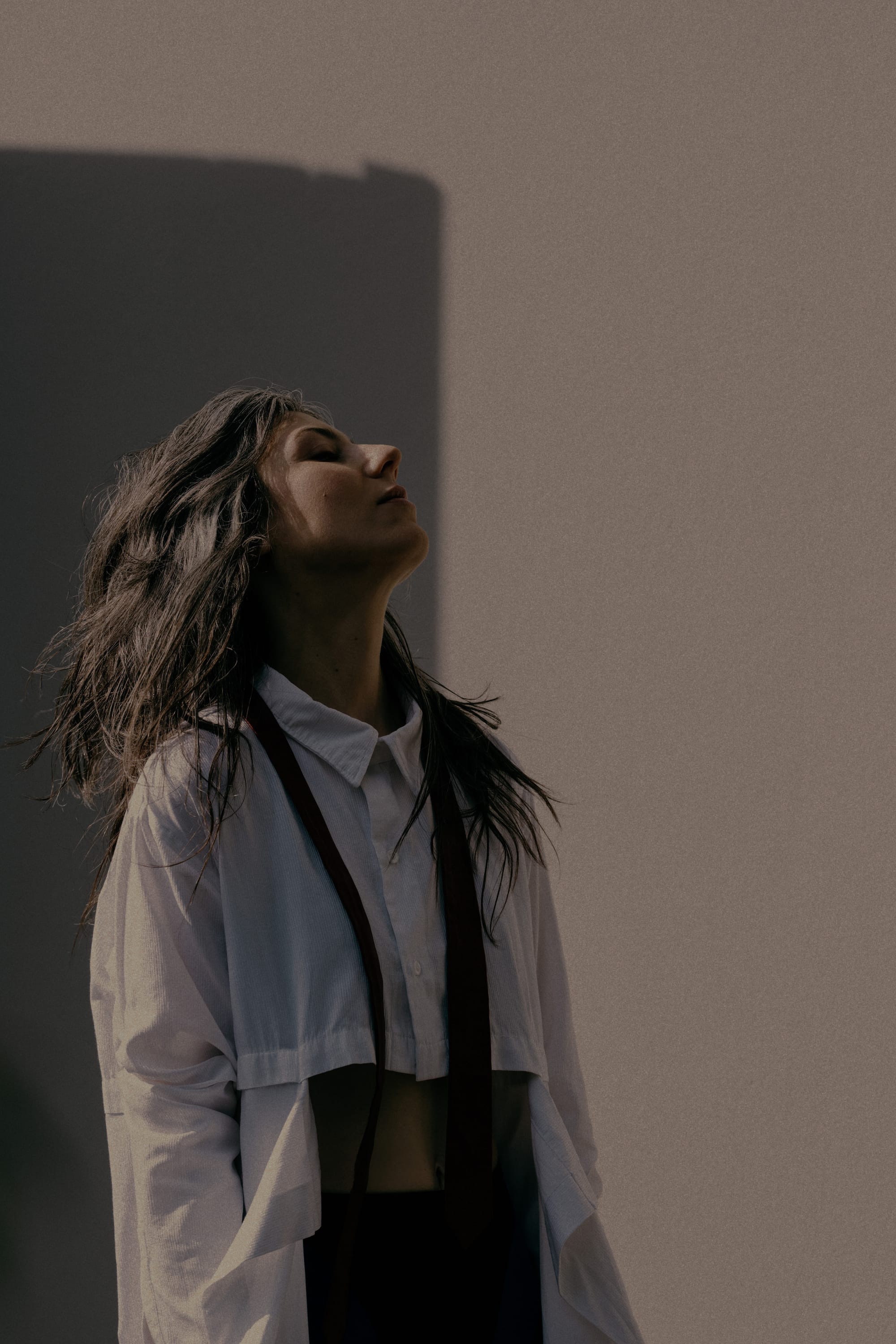Julia Holter on the Beatles, Depression, Parenthood, Streaming, and the Art of Being Controlling

This is a free installment of Larry Fitzmaurice's Last Donut of the Night newsletter. Paying subscribers receive a weekly Baker's Dozen playlist featuring songs I've been listening to lately, along with some criticism around them.
I've loved Julia Holter's music since 2011's mesmerizing Tragedy and she's proven one of the most fascinating artists of the last decade and change; I consider her amongst the experimental pop greats of the 21st century in her ability to conjure songs and sounds that sound like her while also sounding like little else I've ever heard. Her latest, Something in the Room She Moves, is an excellent return that finds a fascinating meeting point between the thorny wilderness of 2018's Aviary with the abstracted, off-kilter pop songwriting that marked her earlier work. I first interviewed Julia a very long time ago, and it was great to come back to chat again 12 years later.
The press materials mentioned that you were watching Get Back before starting work on this record.
I have a lot of feelings about it. I've never been in a band—obviously, I've worked with a lot of people in music, and I've played in people's bands, but only momentarily. That whole creative process is fascinating to me. I'm so controlling over everything, so I just found their whole struggle really beautiful. They weren't against that many odds—they had a pretty good situation—but they were growing apart.
What's cool ab0ut the Beatles is they had the resources to do whatever they wanted, and it seems like they did. That's the other fun thing about them: They were so huge that they could make this weird music and people would listen to it. You don't have to be huge to make weird music, but they were given all this really nice equipment and resources. It's a freakish scenario. They're little brats during Get Back—they're kind of annoying sometimes—but I really enjoyed it.
I like the Beatles a lot, which is the most like basic thing to say, but I just found it really inspiring that people cared this much about music and were giving them these really nice studios.
It's funny that you say that liking the Beatles is a basic observation. I feel like it's actually really important at this point, especially with this collective memory loss that society's afflicted by, to like reinforce that bands like the Beatles made good music. It's almost like checking in with yourself about reality.
That's a good point. I was feeling so stupid for emphasizing the point that their music was good, even though it was really good. I actually still listen to them because my daughter's into it. She loves "Yellow Submarine."

Your daughter's three years old now. How has parenting been?
It's been amazing and really interesting. For someone who's in their late 30s and has spent so much time getting to make music and having time to do that, I knew it was going to be a big life shift. A lot of things haven't changed—I'm a lot more tired, but otherwise I'm much happier. I didn't realize how fun it would be.
When I was talking to Actress recently, he mentioned how having two kids made his creative schedule more deliberate and clear-headed.
Clear-headedness is not a characteristic of mine, unfortunately. Parenting has revealed my attention deficit disorder. It's been very challenging to try to do to work on myself, but I've managed to do it.
I think other people become more clear-headed because they only have a certain amount of time to work. I was always a mess, and I'm still a mess, but I also have to be a responsible parent. But I'm disorganized, and I don't think I'm a good model of a parent that balances everything perfectly. It's a little more chaos with me. It's not a bad chaos, it's just that I'm not like, "Now this is my time to work." It's more, "Okay, now I have time, I'm ready to work"—and then I don't, and then I forget I have to do something else. I'm still trying to figure it out, to be honest—but I don't mean to discourage anyone. It's just that it is chaotic.
I can't really write around other people. To be honest, I haven't written in a really long time, because all the administrative work of putting a record out takes a lot of time. That's kind of sad, to be honest. I just haven't written music in a really long time, and I finished the record over a year ago. I'm trying to figure out how to write, and how to have time to write.
How long did it actually take for this new record to come together?
Three years. I started one of the songs in 2019, but it really started in 2020. I was pregnant and really having trouble with creativity for the first time because I felt so different hormonally, The first trimester was the start of lockdown, March 2020, and it was such a crazy life shift, We'd been touring really intensely in 2019 and we were really tired, so it was good that we weren't touring—but it was also really like depressing, because it was COVID, and people were dying.
I was feeling insane and quite depressed for hormonal reasons, so it was a very challenging time. I remember recording a demo for "Evening Mood" and there was a huge yawn in the demo, because I would literally fall asleep while I was recording. Almost every time I'd try to sit down and write, I'd just fall asleep. It was so weird.
As a person who was never very in touch with my body at all, and perhaps still is not, going through this very physical experience of being pregnant—which, of course, a lot of people experience being pregnant, sure—for me, it was really intense, even though it wasn't bad. I had no problems or anything, it was just so intense. So alongside like a lot of people dying during COVID, the body taking over was overwhelming to me. I don't want to engage with my body.
Because I was dealing with that, it was like hard for me to go deep into creative spaces—but I did, and the work reflected what I was experiencing at that time. The writing continued until the end of 2022, because obviously I couldn't really work on the record when I had my child. We were just so busy. So there were these gaps in which I couldn't really work.
Correct me if I'm wrong here, but I get the sense that you've been in a bit of a transitive period in your life. Is that accurate?
I don't know. I feel a lot less less existential angst than I used to feel. At the same time, I feel a deep foreboding feeling of, I just had a great dream, and now I feel like I don't know about what's going on in the world, but there's somehow a lightness that is there for me that's really nice. I think it has to do with presence, which is something I do talk about with regards to the record. When you're constantly interrupted all the time—that's the case of having a kid—but also having a job, and in a way I do have this other job, which is my record. It's a lot of work, but I enjoy it.
I'm happy. I'm honestly grateful that I have a label supporting me. But constant interruption from one's creative practice brings one into the present all the time, especially for someone like me, who's a real mind-drifter. I grew up having people always waving their hand in front of me and saying, "Earth to Julia!" Having to be brought into the present a lot has been interesting for me—it's been good for me, actually, but it's a challenge for my work and my outlook on things.
I feel like I think a lot more about love. I guess I always did, but in the past I was writing more from a more romantic perspective about distant love. Now I'm very much rooted in this present love, and the depth of long-term love—whether it's a child, your family, your parents, your partner, good friends. I've been really interested in deep friendships. Maybe it's also just something we all need in this time of global turmoil.
I'd like to hear more about what lockdown was like for you.
I don't feel, personally, like I'm 100% back mentally from that experience. I'm always checking with other people to be like, "Are you okay?" Am I the only one who's like that? I had a child, and then also my nephew died, who was 18, which was kind of later on. I don't know if I always associate that with the pandemic, but it was just a weird, terrible time. It's been a lot of adjusting for everybody.
I only bring it up with my record because it really was just part of the setting—mortality, and the body, in the sense that we were all forced to think about bodies and death. We had to avoid everyone's breath, we had to get away from everyone's lungs. It was so intense.
You mentioned earlier how you're controlling when it comes to being creative, especially in comparison with collaboration. Tell me more about that.
I love working with other people. I admit that, for me, at first every time it's a challenge. I'm so controlling, and also quite insecure. I'll be like, "Can you please play my song right," but I get really awkward about it. I get nervous initially, especially because I tend to ask people who are really great musicians. Over time, I've worked on trying to get better at communicating my ideas to musicians. It's always kind of tricky, but they are such great musicians that they can figure it out and do amazing things.
But I've struggled with how to communicate ideas, and the way that I'll often do it these days is I'll usually have a demo that I've worked on that is supposed to represent the song. I'll even sometimes do these insane, terrible MIDI saxophone solos on the recording, just to give the musicians a sense of when the solo happens. Sometimes i'll transcribe the solo, which is also maybe unnecessary—but I'll do whatever I can to try to give them a sense of what I'm thinking. Sometimes I'll just like play something that I like, and be like, "Can you like capture the flowing of this?"
When we were in the studio, I played Chris Speed, who's this incredible saxophone player, this flute music. My partner Tashi and I had spent a lot of time listening to T.R. Mahalingam. Tashi's dad had this great collection of records, and I loved the particular playing and the vibe, which was bird-like and soaring. So I just played that for Chris.
But all these musicians are their own artists. They don't need a lot of help, and I definitely don't need to transcribe solos for Chris. But I do these things anyway, because I love to give people as much information as possible—possibly more than they need. "Ocean" was a synth improvisation I did initially at home on my Nord, and then I decided I wanted to have Chris play over it. Dev Hoff, the bass player, also played over it without really discussing anything at all, which was truly collaborative. That was cool.
Tell me about teaching. You've been a professor at Occidental for a minute now.
I'm just teaching one class. I'd like to teach more, but at the moment I'm teaching Intro to Songwriting, and I really like it. It's really nice to see and hear what people are doing who are, like, 20 years old—what's going on in their creative brains.
Do you think that teaching songwriting in this way has made an impression on how you view your own songwriting process?
One thing that I've thought a lot about is lyrics. I also did this workshop with this organization a few times now on words, non-words, and music. People say like they learn the most from teaching, and I've always found lyrics a struggle. Sound kind of comes to me—it's not always great, but it comes to me quickly. Words take so long for me to get out. It's hard for me, for some reason, so working on that in workshops has been really interesting and it's pushes me to try different things.
The other day, I actually asked my dad to come into the class because he knows about Woody Guthrie. It's so different to think about Woody Guthrie's approach, or even Bob Dylan's approach, to writing. It's about the words, and barely caring about the melody. It's so different than my approach, because I started as a composer and never really thought I'd even be a songwriter, initially. I really struggle with words.
A lot of my students are like me, where they work with sound principally, but there's some also that work with words heavily. I'd like to learn more about writing a ballad, and writing all the lyrics before you write the music. It's an interesting concept. I started using this textbook, which I thought was so lame at first. Then I was like, "Actually, this is so interesting, because they're talking about rhythm and rhyme and the connection between the two." I never think about these things when I'm writing, which is probably good, but it's interesting to learn more about what you do and analyze it in a way you've never done before.
We last spoke when you were just starting to receive attention from the press for your work. What was that experience like at the time?
I'm terrified to think look at what I might've said back then sometimes. When you're in your 20s, you're very arrogant. Honestly, I've been so lucky. I don't have much to negative to say. I've always made the music I want to make. When did you interview me?
2012.
Yeah, I'd been playing for quite a few years. At that age, when you're that young, everything feels different. I'm not gonna be able to do it like that again, forever—playing for a few people in the audience at a loud bar where no one cares what you're doing. I hadn't really gotten to tour until 2012, and it was a big change in my life. I did have some random people that knew my music, but in general I was playing shows locally in a lot of galleries.
2010 might've been the first time I got paid properly for a show. I was a high school tutor, which was actually formative too—but this change for me was really positive. Suddenly, it was just making music and touring, and getting to do all this stuff. The fact that anyone wanted to interview me...I remember my first interview, and I was just so excited and curious. I felt very lucky. It was just a big shift in my life. I was just so happy that people cared about my music, and I continue to feel that way.
It's definitely a more difficult environment now. I don't know if people would be picking up my music now like they were back then, do you know what I mean? That's been my reasoning for working with United Musicians and Allied Workers. I really fear for creative music. The climate is really tough. I feel very lucky, and appreciate how my path has been possible.

I'd love to hear you talk more about your work with UMAW.
It's a really great group of people. I've been involved in the streaming side, because streaming is such a issue. This streaming bill that Rashida Tlaib and Jamaal Bowman are co-leading would create new streaming royalties that will be better for everyone. That's something that the group has been working on. I would definitely not say that I'm the most responsible for all of this work, it's a lot of different people involved. We had like actions two years ago where we went to the Spotify offices and were demanding a cent per stream. It's just a great group, and we just need to have more people organizing in all realms.
Let's just say, hypothetically, you get asked by Spotify to dictate how much they should be charging users every month. How much do you think would be the right amount at this point? I said to somebody the other day that if I was asked to pay $100/month for what they're offering, I'd do it without question—but that's because I listen to a lot of music.
Oh my God, I don't know. I don't even want to answer that. I understand what you mean, but I don't think it needs to be a hundred dollars a month. I mean, I think that's great, but I don't think that that's what it needs to come down to, because if you say that, then everyone's gonna freak out.
I should be honest: I don't think it should be what it is now, which is mostly free. What we're saying with this streaming bill is that it would not be that big of an increase, which is important to note. It's not like everyone's suddenly going to be paying $200 a month. It's these small changes that can make a big difference, which is the best point to make.